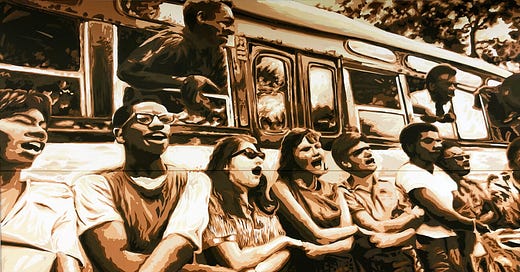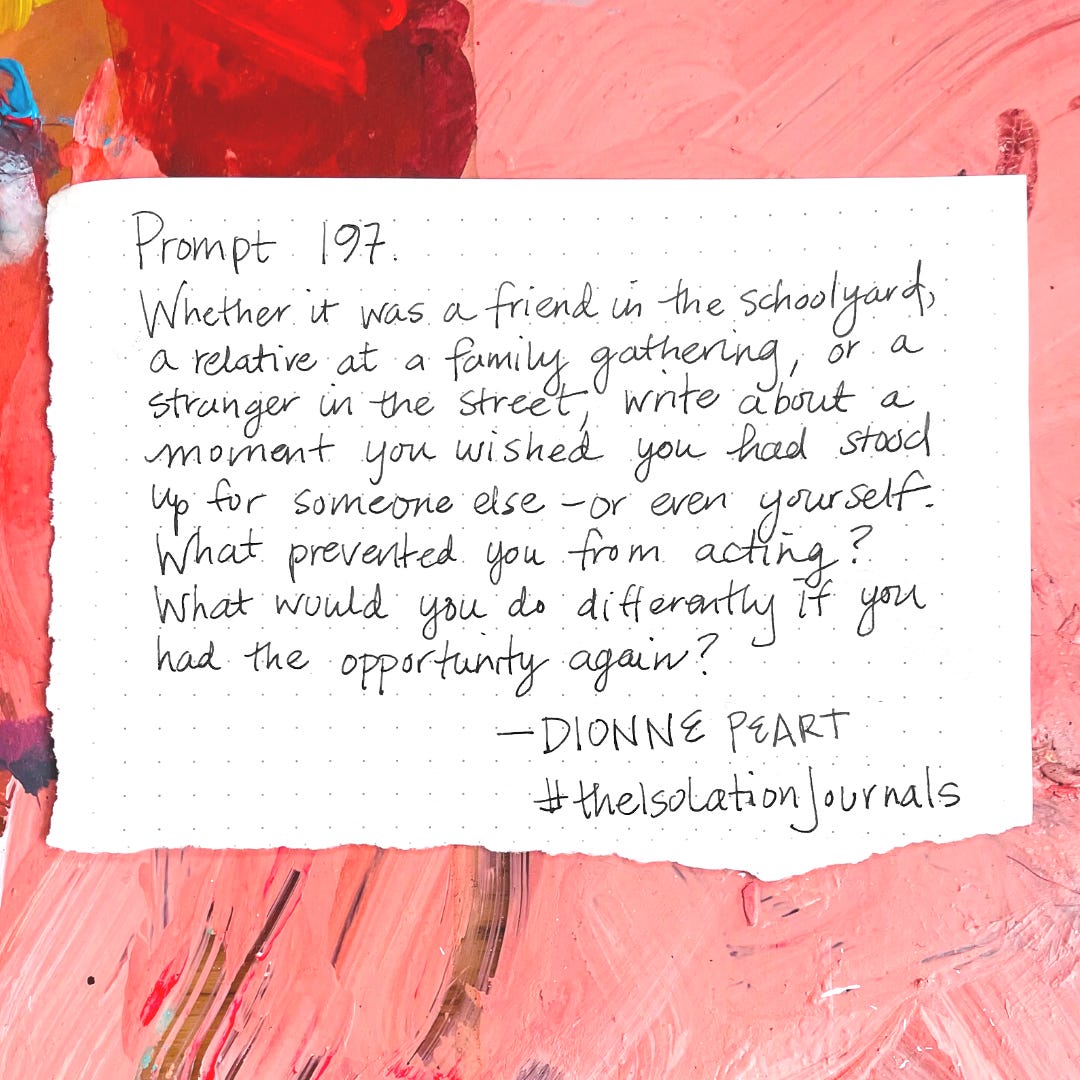Prompt 197. Use Your Voice
& an essay and prompt on being silent by Dionne Peart
Hi friend,
On Wednesday, following the news of the horrific shooting in Uvalde, Texas, I was frozen by a familiar feeling of confusion and helplessness. I was in my office with a terrible headache, nausea, and a four-month old foster puppy named Fran in a crate down the hall emitting an ear-splitting howl. At that moment, I felt competing impulses. I wanted to crawl into bed, ignore the puppy, ignore work, ignore the world. At the same time, I wanted to attend to my responsibilities as a person, a potential new dog owner, and a citizen.
I talked about this later with my family—the sense of overwhelm and helplessness that we felt, which I know lots of others felt as details emerged, as the photographs of each child came across our news feeds. It’s easy to feel clobbered by the compounding grief and by what the New York Times called “the psychic numbing of mass tragedies”—and at the same time, to feel a mounting sense of urgency.
Those two things feel in opposition to each other, such a weird push and pull, and the confusion is only heightened by the furor on social media, where there’s this pressure to say something, to make sure to say it right, and also this worry that it won’t make any difference. It can be hard to discern: What is my responsibility? Where is my power? And how do I exercise it in the most impactful way?
Sometimes our impulse is to look away, to buffer ourselves against discomfort. But what we practice here at the Isolation Journals is the opposite of that. We don’t arm ourselves against what ails us or what hurts us or discomfits us, but we write into it. We paint toward it. We explore it and transform it. Through this practice, we move from overwhelm and confusion toward clarity and calm, toward thoughtful action.
Today we have a prompt from my sweet friend Dionne Peart—about inaction and action, about staying silent and speaking up. Originally inspired by the trial for the murder of George Floyd, which we marked the second anniversary of last week, it’s an important reminder of our ability and our responsibility to use our voices for change.
Sending so much love,
Suleika
P.S. The world is like a lot right now. Do you have a question for me about life or writing or anything in between? Something we can parse through together? Soon I’ll be writing the next installment of Dear Susu, my advice column, and I’d love to hear from you. Email me at suleika@theisolationjournals.com with the subject line “Dear Susu.”
In addition to today’s prompt from Dionne Peart, I’d like to offer a few other actions you can take:
Donate to Mom’s Demand Action.
Donate to the City of Uvalde’s fund for the victim’s families.
Contact your legislators to demand common sense gun reform.
The Isolation Journals is my newsletter for people seeking to transform life's interruptions into creative grist. Both free and paid subscriptions are available.
The best way to support my work is with a paid subscription, where you get added benefits like access to my advice column Dear Susu, our virtual writing hour the Hatch, and other opportunities for creative connection.
Prompt 197. Being Silent by Dionne Peart
My brother and I were raised in Canada, but our parents always shared wonderful memories of growing up in Jamaica. When I was nine, my parents planned our first trip “back home,” and I was looking forward to experiencing the paradise my parents so strongly identified with, and to meeting both sides of our family, since we didn't have any relatives in Canada. At the last minute, a work commitment kept my dad from coming with us, but my strong and fiercely independent mom would handle everything. She was soft-spoken, but she had a sharp tongue and would sort out anyone in defense of her loved ones, even if the offender was twice her size. I knew we would be fine.
The plan was to spend two weeks in my mom’s hometown and one week with my dad’s family. Each of us brought an extra suitcase full of gifts for relatives and friends, and Mom was particularly generous with her cousin, who came by my grandmother's house every day to take us around. People seemed genuinely excited to see us, and I could tell Mom was feeling embraced and welcomed. But around our third or fourth day, on our way to visit someone, we encountered a woman on the road who Mom's cousin seemed to know well. We stopped, and Mom’s cousin said something like, “You remember Monica? She’s visiting from Canada.”
The woman looked us up and down and said, “Foreigner!” with such venom and spite, it caught us all off guard.
Mom’s cousin replied, “I’m not a foreigner.”
The woman replied, "No, but she is."
I could see the shock and hurt on my mom’s face, but she said nothing. Mom’s cousin also said nothing. I wanted to stand up for Mom, tell this woman not to talk to my mother that way. I wanted to ask Mom’s cousin, “Aren't you going to stick up for her? You know she’s still Jamaican! This is her home too!” But I was raised to never talk back or confront adults, and I didn’t want to risk physical punishment. I remained silent.
The woman stared us down and finally went on her way. Mom’s cousin started chatting again like nothing, but I could tell Mom’s mood had shifted. She felt unwelcome, a core part of her identity stripped away. We ended our stay a week early and went to see my dad’s family.
I’ve always regretted not telling that woman off—and Mom’s cousin too—like Mom would have done for me. It likely would have meant a “good backsiding” for disrespecting an adult (even a rude one), but since Mom always stood up for everyone else, someone should have stood up for her. I should have chosen her comfort over mine.
Since the trial for the murder of George Floyd, my mind often returns to the witnesses who tried to intervene that day. I reflect on what compels us to stand up for someone else, and, even more than that, the reasons we don’t.
Your prompt for the week:
Whether it was a friend in the schoolyard, a relative at a family gathering, or a stranger on the street, write about a moment when you wished you had stood up for someone else—or even yourself. What prevented you from acting? What would you do differently if you had the opportunity again?
If you’d like, you can post your response in the comments below, in our Facebook group, or on Instagram by tagging @theisolationjournals.
Today’s Contributor
Dionne Peart is an attorney, serving as Executive Director for Adjunct Services at Georgetown University Law Center. She is the 2019 winner of The Caribbean Writer’s Vincent Cooper Literary Prize, and her work has appeared in Midnight Breakfast, Akashic Books’ Duppy Thursday series, and the Writer’s Digest Short Story Competition Collection. A finalist for the D.C. Mayor’s Awards in the Larry Neal Writers’ Award category, Dionne received her MFA in Writing with a concentration in fiction from Bennington College.
Featured Community Member of the Week
Isabella El-Hasan is an illustrator and artist and mother of two who lives in the south of the Netherlands. She discovered the Isolation Journals on April 2 of this year, and the timing was perfect. “I’d just finished a project for our local council,” she said, “and I was longing to just create things because I want to, not to satisfy a client.”
Isabella’s project is an analog drawing every day—a switch from the digital drawing that has been her more common mode over the last year. For the first 50 days, she used a black ink Pentel penbrush, quick-drying with the same fluidity as a watercolor. Then, to keep from getting too comfortable, halfway through she switched to colorful Ecoline pens, which behave very differently on the page.
“I approach it as a meditation,” Isabella says. “I try to empty my mind of any ideas and expectations and just let the brush glide along the page. No good, no bad, just ink and paper. And almost like magic, shapes appear from the unseen realm and materialize in this dimension.”
Learn more about the 100-day project.
For more paid subscriber benefits, see—
On the Quarryings of Time, a reading and reflection on Annie Dillard’s Pilgrim at Tinker Creek and a writing prompt from our last meeting of the Hatch
Cultivating Seed Dreams, a reflection and community discussion celebrating Day 50 of our 100-day project
Dear Susu #5: Marriage Vows & the Myth of the Good Catch, on the source of our self-worth

















This prompt is so timely for me. I’m really challenging myself to use my voice and not stay quiet right now. And I’m really proud of myself for calling some people out on their bad behavior just yesterday (the world did not end, I did not implode, why was I so scared?!)
i'm 79 years old so i know in my lifetime i should have and did not stand up and defend a lot of people but in my 20's i started to look for "truth" and as the years went by when i found out the truth and justice and caring and compassion and when i stopped caring what people thought of me and what they said to me and when i stopped being "offended" then i started sticking up for truth and the people who needed someone to speak up for them. Thank you for this great topic Suleika